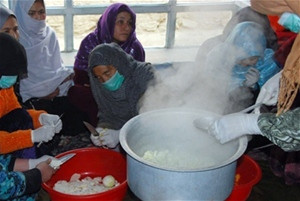
Khanom Ghul prepares mixed vegetable pickles at a food processing training organized by the Afghan Women’s Business Council (AWBC). In one day, her group is able to pack 20 bottles of pickles and jams and sell them all in the market. “It feels good to be
USAID/ASAP
A USAID-funded project allows women from Kabul to harvest and market the fruit and vegetables grown at Badam Bagh farm
26 APRIL 2011 | KABUL, AFGHANISTAN
For five days a week from August to December 2010, Khanom Ghul, a homemaker and a mother of six, attended training on food processing. She and 234 other young women and housewives from Dast-e-Barchi in the western part of Kabul City learned how to make pickles and jams, while another 321 women from Arzan Qeemat district in Kabul trained on the production of handicrafts. The women derived income from their newly learned skills at the end of the day by selling their products on the local market.
The Afghanistan Women’s Business Council (AWBC) is an Afghan non-governmental organization that helps women develop sustainable income-earning activities. AWBC is a partner with USAID on a gender project that allows its female members to harvest and market the fruit and vegetables grown at Badam Bagh, a USAID-supported demonstration and research farm owned by the Ministry of Agriculture, Irrigation and Livestock. From April 2010, through December 2010, AWBC earned more than $43,150, and provided incomes to 2,475 women workers. AWBC is now using the livelihood skills training to spread the benefits to marginalized women.
Mahooba Waizi, chief executive officer of AWBC, explained that she used the savings from the sale of the Badam Bagh income to finance the livelihood training. There are six training centers in Dast-e-Barchi teaching food processing, and seven centers in Arzan Qeemat teaching handicrafts. To begin the program, AWBC conducted a survey of women who were most in need and who were anxious to learn and would pledge to attend all training sessions. Next, AWBC selected women leaders to act as instructors and training managers and paid salaries and provided transportation allowance to them. AWBC also procured the initial raw materials and equipment for the training period with the understanding that once they brought their goods to market, they would purchase their own supplies.
“We hope to take this home-based operation to a commercial scale. There is a good market for processed food and handicrafts in our communities and among the expatriates,” said Mahooba. “A little support goes a long way in getting women started on a small enterprise.” AWBC hopes to be able to reach more women through the profits from Badam Bagh.







Comment
Make a general inquiry or suggest an improvement.